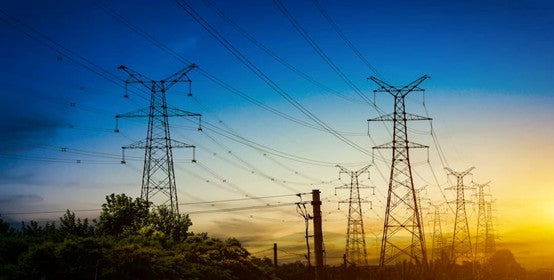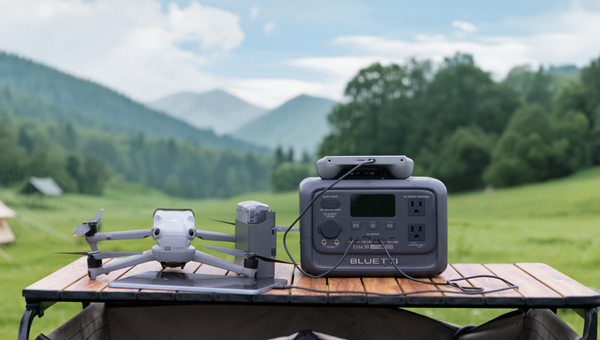Your cart is empty
Shop our productsMobile phones are becoming increasingly reliant on ever-growing battery capacities. With so many people relying on their phones for communication, entertainment, and a long list of other tasks, knowing how many watts it takes to charge a phone is an important part of understanding and properly caring for your device. This article will explain in detail how many watts are required to properly charge a phone, the differences between phone chargers, and the best practices for keeping your phone's battery healthy. The goal of this article is to give users the knowledge they need to understand why their phone's battery is so important, how to keep it healthy, and which phone chargers are best for their device.
How much electricity does a phone charger use?
Most phone chargers used today convert the electricity from the wall outlets into 5 volts of DC power that can be used to charge a phone. The amount of electricity used by a charger depends largely on the device it is charging. Generally, a standard phone charger will draw approximately 5 watts of electricity when it is actively charging a device. This means that for 1 hour of charging, the charger will consume 0.05 kWh of energy. In a month, the charger will draw 1.5 kWh of electricity, and in one year, it will total 18 kWh. This means that the total cost of using a phone charger for a year is just a few dollars.

How Many Watts Do Different Phone Chargers Use in a Year?
The wattage of a phone charger determines how much energy it uses when it is plugged in and charging our phones. The amount of energy that a phone charger uses in a year can be calculated by multiplying the wattage of the charger by the hours that the charger is used in a year. Watts are measured in kilowatt-hours (kWh).
Different types of phone chargers have different wattages. Battery chargers for phones often have low wattage, around 2 watts, while wall chargers typically have a wattage of 5 to 10 watts. USB chargers, which are often used to transfer data as well as charge phones, have wattage of around 1.5 watts. Wireless chargers have the highest wattage out of all phone chargers, usually around 15 watts.
By multiplying the wattage of different phone chargers by the number of hours they are used in a year, we can estimate the annual energy use of each type of charger. A battery charger running for 8 hours per day, or 2,920 hours per year, will use roughly 5,840 kWh (2 watts x 2,920 hours). A wall charger running for 4 hours per day, or 1,460 hours per year, will use between 7,300 and 14,600 kWh (5-10 watts x 1,460 hours). A USB charger running for 3 hours per day, or 1,095 hours per year, will use 1,643 kWh (1.5 watts x 1,095 hours). A wireless charger running for 2 hours per day, or 730 hours per year, will use 10,950 kWh (15 watts x 730 hours).
The wattage of a phone charger is an important factor to consider when we are thinking about the energy usage of our phones. By calculating the kilowatt-hours used in a year, we can understand the true energy impact of our phone charging habits.

How Much Does It Cost To Power A Phone Charger?
Most smartphone chargers use a USB connector and draw 5 volts of power from the outlet. The amount of power drawn, that is, the watts, depends upon the device being charged. However, the average power used is roughly 2.5 watts per hour, as most devices require 1.5 amps of current.
The cost for charging a phone per hour depends on the average electricity rate where you live. The average electricity rate in the U.S. is 12.5 cents per kilowatt-hour, which translates to a cost of approximately 3 cents per hour of charging. Over a month, the cost to charge a phone would be around 72 cents. Over a year, that cost would be around $8.64.
Charging your phone does not have to be expensive, however. There are energy-saving chargers available, which draw less electricity and cost less to power. There are also solar-powered chargers, which are a great way to charge phones without creating any additional cost. charging your phone at night is the most cost effective option, as electricity rates are often lower at night.
Do Phone Chargers Use A Lot of Electricity?
Phone chargers are a ubiquitous part of everyday life. We plug in our phones nearly every day, but do phone chargers use a lot of electricity? It is a valid question, given how often we use our phones and the amount of power they consume.
The short answer is no, phone chargers do not use a lot of electricity. The amount of electricity used by a phone charger varies greatly, depending on the type and size of the phone. Smaller phones generally use less electricity while larger phones use more electricity. Generally speaking, it takes between 5 and 10 watts to charge a phone, and the average household in the U.S. uses about 900 kWh per month. That means that even if you use your phone charger every day, it will only account for a small fraction of your monthly electricity use.
It is important to note that while phone chargers may not use a lot of electricity, some can be inefficient. Chargers that are not designed to charge quickly can draw more power than necessary, resulting in higher electricity bills. Additionally, some chargers are prone to wasting energy, even when the phone is not plugged in. This is because many chargers continue to draw a small amount of electricity even when not in use. To combat this, it is important to unplug your charger when not in use, or to invest in an energy-efficient charger.
Though phone chargers may not use a lot of electricity, it is important to be aware of how much electricity they consume. By understanding how phone chargers use electricity, you can make more informed decisions about how to use your charger and how much energy you are consuming.

How Many Watts Does It Take To Charge A Phone?
Charging your phone is an essential part of owning a mobile device. But how many watts does it take to charge a phone? This depends on the type of phone, the battery capacity, and the charging speed. Generally, most phones will require between 5 to 15 watts to charge. This number can vary depending on the type of charger used, the battery size, and how quickly the phone is charging.
For example, a typical smartphone with a battery capacity of 3000mAh will require approximately 5 watts to charge, while larger phones with a larger battery capacity may require up to 15 watts. Additionally, some chargers provide faster charge speeds than others. For example, a fast charger will usually require more watts than a standard charger. Furthermore, wireless chargers may also require more watts than a cable charger.
It is important to note that the amount of watts required to charge your phone depends on several factors. Therefore, it is important to make sure that you are using the correct charger and wattage for your device. Additionally, you should always check the manufacturer's instructions for the proper wattage for your device.
the amount of watts required to charge a phone can vary depending on the type of phone, battery size, and charging method. Most phones will require between 5 to 15 watts to charge. Always make sure you are using the correct charger and wattage for your device, and follow the manufacturer's instructions for the proper wattage.
Is 20 Watts Enough To Charge A Phone?
Many people want to know if 20 watts is enough to charge their phone. The short answer is yes, but it depends on the type of phone and how quickly you want it to charge. For many of the latest models of smartphone, 20 watt charging is a slow but steady charge that will result in a full charge over time. Some newer phone models may require higher wattage, as some phones are designed to charge faster.
For example, the iPhone 11 Pro Max has an 18-watt power adapter that comes with the phone. This means that charging the iPhone 11 Pro Max with a 20-watt charger will take longer than if you use the 18-watt adapter that comes with the phone. This is because the 18-watt adapter is able to deliver more power, which can result in faster charging speeds.
It's important to note that many phones come with a cable that is rated for a certain wattage. For example, the iPhone 11 Pro Max comes with a USB-C to Lightning cable that is rated for 18 watts. If you try to use a 20-watt charger with this type of cable, you may not get the fastest charging speeds. It's important to make sure that you use the right type of charger and cable to get the fastest charging speeds with your phone.
There are also some phones that require more than 20 watts for fast charging. For example, some Samsung phones require a 25-watt charger for fast charging. If you try to use a 20-watt charger with these phones, you may not get the fastest charging speeds that are possible with the phone.
In general, 20 watts is usually enough to charge most phones, but it may take longer than if you use a higher wattage charger. If you want to get the fastest charging speeds with your phone, it's important to make sure that you use the right type of charger and cable for your phone.
1. What type of phone do you want to charge?
The type of phone you want to charge is an important factor in determining how many watts it will take to charge it. Different types of phones require different amounts of power to charge, depending on their size, battery capacity and the technology used to charge them. Some phones will require more wattage than others, while others may require less. For example, an iPhone 6s might require more wattage to charge than an iPhone 8 Plus. Additionally, a phone with a high-capacity battery might require more wattage than a phone with a smaller battery. Understanding the type of phone you’re trying to charge is essential when determining how many watts it will take to get it charged up.
2. What type of charger are you using?
What type of charger are you using?
The type of charger used can have a significant impact on how much power it takes to charge a phone. Different types of USB chargers, like standard USB, QuickCharge, and USB-C, deliver different voltages and current levels. Standard USB ports typically deliver around 5 volts of power, while QuickCharge and USB-C ports can provide up to 20 volts of power - far more than what's usually needed to charge a phone. Each type of charger also has a set amperage rating, which is the amount of current it can provide. A higher-amp charger will charge the phone faster, but can also put the phone at risk for damage if it's not designed to handle the current. Ultimately, the type of charger you're using can make a difference in the amount of power needed to charge your phone.3. What is the input voltage of the charger?
Understanding the Input Voltage of the Charger: It is important to know what voltage is used to charge a phone. Different chargers use different voltages, so it is essential to check the label of the charger before plugging it in. Voltage is measured in volts (V), and it is the amount of electrical force being used to move electrons through a circuit. Knowing the voltage is important, since too low of a voltage can prevent a phone from charging, while too high of a voltage can damage the phone. By understanding the input voltage of the charger, you can be sure that your phone is getting the proper amount of electrical charge.
4. Does the phone support fast charging?
The answer to this question is essential in understanding how many watts are needed to charge a phone. Depending on the type of charging technology used, different wattages are required to charge a device. The most common type of charging technology used in phones is fast charging, which requires high wattages such as 5 watts or more. If the phone in question does support fast charging, then it is likely to require at least 5 watts to charge. However, if the phone does not support fast charging, then the wattage required to charge it will be significantly lower.
Therefore, it is important to determine whether or not the phone supports fast charging in order to accurately assess how many watts are required to charge it.
5. What is the capacity of the battery in the phone?
What is the capacity of the battery in the phone?
The capacity of the battery in the phone is an important factor to consider when calculating how many watts it takes to charge the phone. Every battery has a different capacity, which affects the amount of energy needed to charge it. Generally, the higher the capacity of the battery, the more energy it will require to charge. Additionally, different types of batteries carry different capacities – for example, lithium ion batteries usually offer higher capacity than other types of batteries. Knowing the capacity of the battery in your phone will give you a better idea of how many watts you need to charge it.Charging your phone requires a certain amount of wattage, depending on the type of device and the type of charger used. Generally, it takes between 10 and 20 watts of power to charge a phone. Modern phones also have a feature referred to as "Quick Charge" or "Fast Charge," which can use more wattage to charge the device more quickly. It is important to use the type of charger that is specifically designed for your device. Using the wrong charger can result in damage to your phone and potential safety hazards. Ultimately, it is best to consult your device's manual or the manufacturer for the optimal wattage when charging your device.
Shop products from this article
Be the First to Know
You May Also Like

Cherokee Electric Cooperative: Bill Pay, Outage Map, and Customer Service Guide
Cherokee Electric Coop is a local electric cooperative that provides reliable energy services to its members. This article provides important information about this cooperative, such as how to pay your...

Central Florida Electric Cooperative: Pay Bill | Outage Map | Customer Service | Phone Number
This article will discuss the services offered by Central Florida Electric Cooperative and provide customers with important information about how to pay their bills, check outages maps, get customer service,...

BVU Authority: Pay Bill | Check Outage Map | Customer Service | Phone Number
This article is all about providing readers with vital information about Bvu Authority, one of the leading utilities providers in the United States. We will cover topics such as how...






















































































































































































































































